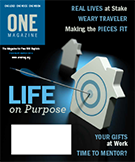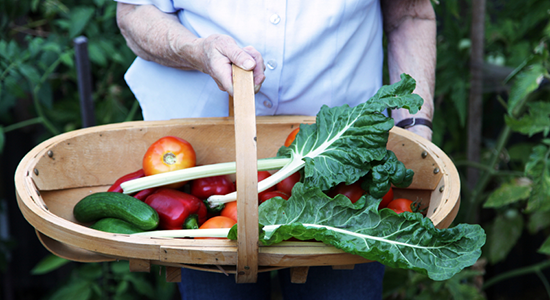
February-
March 2014
Life on Purpose
------------------
|

Filling More Baskets
by D. Ray Lewis
Retirement marks a major change in our lives, a shift in our pattern of living. For 30 years or more, work has been our most time-absorbing activity. Our whole schedule has been structured around work. Eating, sleeping, weekends, and vacations largely have been determined by the demands of the job. Suddenly, this activity will be dissolved.
The word retirement conjures up all kinds of reactions from people. Many think about it and can’t wait to begin. They view retirement as the moment when they finally will have time to do all the things they did not have time to do during their working years.
Others consider it with dread, wondering what in the world they will do with themselves. Still others realize that retirement is just another transition of life, and they plan for it. With proper planning, retirement can be the most fulfilling and rewarding time of life.
Over the years, how often have you longed for time away from day-to-day obligations to do what you wanted? Time is precious, and when a few free moments come along, we cherish them. They always seem to end far too soon—never enough time.
In retirement, we face the opposite situation, the potential for loads of free time. Aside from sleeping and eating, we will have close to 100 hours at our disposal each week. What to do with all this free time? Your newfound freedom from the workplace provides a chance to fulfill your dreams. Take advantage of it!
In planning for leisure time, we need to begin by asking some important questions: What were my interests in the past? What are my present interests? What have I always thought I’d like to do but have never done?
You may know exactly what you want to do. You may have special projects lined up or perhaps a “whole lot of nothing” planned. That’s fine. But if you are like most people, after the projects are completed and the initial excitement wears off, you will find yourself at loose ends. It is a very unusual person who can continue doing nothing and remain happy. Most of us need something to do, a mission. As long as we have regular duties, we don’t have to think about how to keep occupied. But after retirement, time will not fill itself.

Consider variety in spending your time. The old saying “Don’t put all your eggs in one basket” applies not only to investments but also to time. Too often, people find they’ve put their lives into a “one-basket pattern” of work and family. The transition from busy career to leisurely retirement is a wonderful chance to find and fill more baskets.
Playing, exercising, entertaining others, and simply relaxing all have their proper place. But retirement can also be a great time to try new things. Being active is the best way to feel good about yourself and your life, and being active brings you into contact with others, providing mutual stimulation and excitement.
Many retirees return to the classroom. For several years, I taught in the Adult Community Education program in Nashville, Tennessee. I always had several retirees in these classes. When I asked one older gentleman why he was taking my class, his response was typical of many other retired students. He told me that all the years he worked, he kept telling himself that when he retired he would learn two things: to type and to play the piano. He was not only taking my typing class, he was also taking private piano lessons. He had discovered the secret of filling more baskets.
Many retirees enjoy traveling. This is more than sightseeing. It promotes interaction with other people in other places. Many organizations sponsor trips designed for retirees.
Retirement also provides opportunities for volunteerism. From numerous opportunities in the local church to other worthwhile organizations, retirees should continue to use skills, talents, and services developed during working years.
Many retirees return to the job market. Some do this to supplement their income. Others just want to do something productive. Retirement provides a good time to work at something you choose to do rather than something you have to do.
The list goes on and on of ways to use leisure time in retirement. There are so many opportunities that you could easily become overwhelmed in deciding what activities will be most rewarding.
Remember, you have earned your leisure time and concentrate on those activities that interest you the most.
About the Writer: D. Ray Lewis joined the Board of Retirement in 1982. He became director in 2005 after serving for several years as assistant director.
|
|

